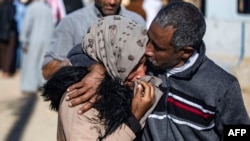The Kurdish-led Autonomous Administration of North and Eastern Syria (AANES) released 141 prisoners Monday from Alaya Prison in the city of Qamishli, as part of a general amnesty for prisoners convicted of terrorism-related offenses linked to ISIS, provided they did not participate directly in combat. The next day, 68 more prisoners were freed from the Central Prison in Manbij. So far, three groups of prisoners have been released from facilities in Hasakah, Qamishli, and Manbij. The initiative is expected to benefit approximately 1,500 prisoners, most of whom are from the Deir ez-Zour, Raqqa, and Manbij regions.
Families of the released prisoners have expressed their relief and joy. Issa Mahmoud al-Awad, an elder of the al-Jibur tribe, commended the initiative, stating, "Thanks to the autonomous administration for this general amnesty. It represents a positive step toward forgiveness, brotherhood, and stability in the region."
The general amnesty announced by the Democratic People's Council of the AANES on July 17, 2024, was based on the recommendation of the tribal forum titled “Dialogue, Safety, Construction for a Unified Decentralized Syria,” held in Hasakah on May 25, 2024.
Arab tribal leaders have praised the AANES for fostering domestic peace and promoting coexistence through the amnesty.
Khalid al-Khaloufi, Sheikh of Ela al-Khawatine, expressed his gratitude. "I thank the Autonomous Administration on behalf of all the tribes. We are hopeful that this will lead to the release of all prisoners and benefit everyone involved," he said.
The amnesty has elicited mixed reactions. Amnesty International lauded the decision as an "important step" but called for an expansion of the initiative and the release of additional prisoners. The organization expressed concern over the detention of tens of thousands of individuals without charges or trial and urged the United Nations to facilitate urgent screenings to address potential violations of international law.
Conversely, the Syrian Kurds, especially the Yazidi community, have voiced apprehension about the amnesty. They fear that some released prisoners may return to ISIS ranks or still hold extremist views. Ziwar Sheikho, a Kurdish analyst, journalist and director of an NGO, highlighted the risks, noting the potential danger posed by individuals with a history of extremist activity.
"Especially for us Kurds, who have faced attempts of genocide, particularly against the Yazidi community, the release of these individuals poses a significant risk to society. It is crucial to assess whether these individuals can integrate into society and to what extent they may still support ISIS ideologies," Sheikho said.
The release initiative is expected to continue, with ongoing assessments and approvals for those benefiting from the amnesty.
This story originated in VOA’s Kurdish Service. Robin Rushmore contributed.




